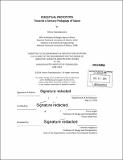Perceptual prototypes : towards a sensory pedagogy of space
Author(s)
Papadopoulou, Athina, S.M. Massachusetts Institute of Technology
DownloadFull printable version (15.29Mb)
Other Contributors
Massachusetts Institute of Technology. Department of Architecture.
Advisor
Terry Knight.
Terms of use
Metadata
Show full item recordAbstract
Architecture education, by being enclosed in studios and by focusing on formal qualities of spaces, has been detached from the direct experience of space and has prioritized vision over the other senses. If we are to extend our spatial understanding, we need to expand the boundaries of our sensory perception by developing tools and situated learning strategies focused on the interaction between our bodies and the built environment. I propose the Perceptual Prototypes as tools through which we can sense and experience space. My hypothesis is that the Perceptual Prototypes can augment our understanding of space by allowing us to focus on each of our senses individually. As precedents I discuss pedagogies of the Montessori method and the Bauhaus school, which focused on the separate training of the senses. I then draw upon studies in psychology and cognitive science to suggest that we can train our senses by 'sensing through' and 'experiencing through' the tools we use. To demonstrate the pedagogical implications of my thesis, I first discuss the procedure and results of the workshop 'Perception Creatures' I co-taught during IAP. Students designed their own 'creatures' using sensors to study the body-space interaction. I then proceed with an experiment where I ask participants to explore a physical space by using a wearable tool - the Perceptual Prototype - that I developed. In the experiment the tool takes again the role of a creature, which is limited to a specific sense. Asking participants to act as host for this creature, I study how they experience the space by focusing on each of the different senses. The results of the case studies demonstrate the enriched experiences and perceptions that emerge through the use of the Perceptual Prototypes suggesting a direction towards a sensory pedagogy of space through the use of tools as 'objects to sense with' in the learning process.
Description
Thesis: S.M., Massachusetts Institute of Technology, Department of Architecture, 2014. Cataloged from PDF version of thesis. Includes bibliographical references (pages 76-78).
Date issued
2014Department
Massachusetts Institute of Technology. Department of ArchitecturePublisher
Massachusetts Institute of Technology
Keywords
Architecture.